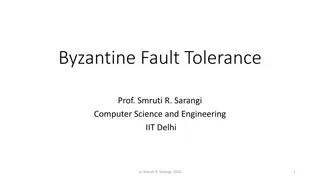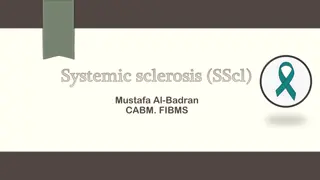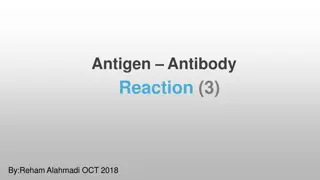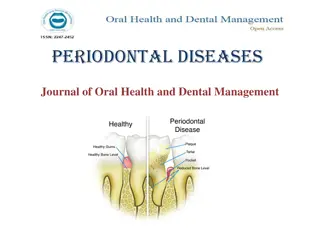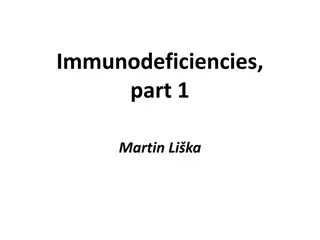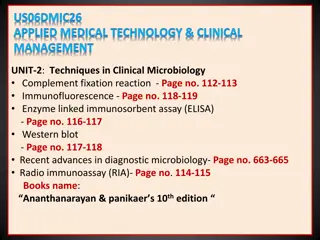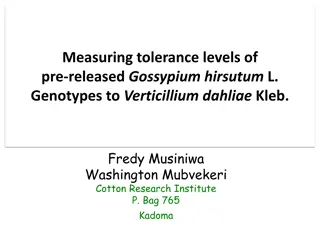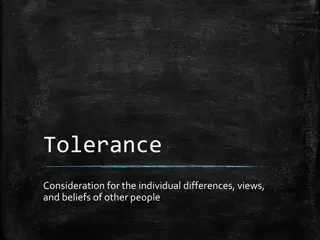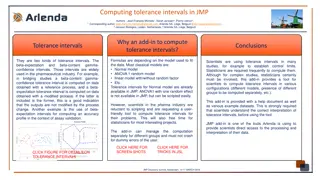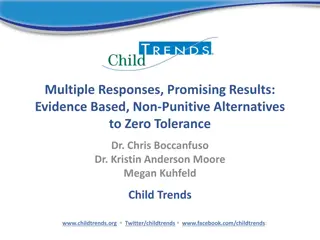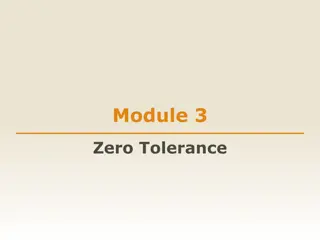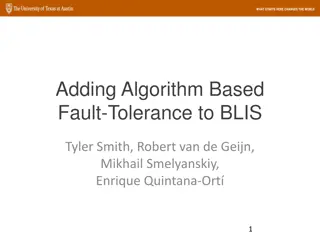Investing Strategies
Get comprehensive guidance on investing strategies, risk tolerance, and types of investors. Understand the importance of setting investment goals and managing emotions while investing. Learn how to assess your risk tolerance and make informed investment decisions for a secure financial future. Popu
2 views • 36 slides
Zero Tolerance Initiative: Protecting Florida's Vulnerable Populations
The Agency for Persons with Disabilities (APD) in Florida is dedicated to supporting individuals with developmental disabilities and combatting abuse, neglect, and exploitation. Through their Zero Tolerance Initiative and community efforts, they aim to empower individuals to report incidents and bre
4 views • 29 slides
Professional Learning Framework for Inclusion, Wellbeing, and Equalities
Explore the Window of Tolerance and its importance in well-being and professional development within Scotland's educational landscape. This resource provides insights on regulating emotions, expanding tolerance levels, and supporting others effectively. Utilize slides for group learning or self-dire
1 views • 16 slides
Understanding Diseases Associated with Homeostasis in Endocrine, Nervous, Immunological, and Genetic Levels
Exploring diseases related to disruptions in homeostasis at endocrine, nervous, immunological, and genetic levels, focusing on conditions like hormone imbalances and metabolic disorders such as growth hormone deficiency and diabetes. Learn about the impact on health and the body's intricate regulato
5 views • 38 slides
Transplantation Immunology
Learn about histocompatibility systems, alloantigen recognition, graft types, graft rejection mechanisms, graft-versus-host disease risk factors, HLA typing methods, and detecting HLA antibodies in clinical transplantation. Explore hyperacute and acute rejection episodes, their immunological mechani
4 views • 11 slides
Understanding Byzantine Fault Tolerance in Distributed Systems
Byzantine fault tolerance is crucial in ensuring the reliability of distributed systems, especially in the presence of malicious nodes. This concept deals with normal faults, crash faults, and the challenging Byzantine faults, where nodes can exhibit deceptive behaviors. The Byzantine Generals Probl
0 views • 29 slides
DBT Review of Distress Tolerance Skills & Crisis Survival Techniques
Explore DBT review of distress tolerance skills and crisis survival tactics including STOP method, pros/cons evaluation, crisis urge management, TIP technique and Wise Mind principles. Learn when to apply crisis survival skills and how they can aid in managing short-term crises effectively.
1 views • 15 slides
Understanding Acquired Immunity and Its Types
Acquired immunity, also known as adaptive immunity, is the resistance developed by an individual to foreign molecules. It involves antigenic specificity, diversity, immunologic memory, and self/non-self recognition. The two main types of acquired immunity are active immunity, developed from antigeni
3 views • 17 slides
Exploring TOLERANCE - Artwork by Guy Ferrer
Guy Ferrer, a contemporary French/Mediterranean artist, created the TOLERANCE series to address religious tensions and promote compassion, hope, and mutual respect. Through his sculptures, Ferrer advocates for universal tolerance, emphasizing the importance of accepting different beliefs to foster h
0 views • 16 slides
Continental Drift, Theory of Tolerance & Major Biomes of the World Overview
This detailed presentation explores topics like Continental Drift, the Theory of Tolerance, and Major Biomes of the World. It covers the history of the Continental Drift theory, from Wegener to Du Toit's modifications, and delves into the various terrestrial biomes that exist, including tundra, bore
2 views • 26 slides
Understanding Systemic Sclerosis: Causes, Symptoms, and Management
Systemic sclerosis (SScl) is an autoimmune disorder affecting connective tissue, leading to fibrosis in the skin, internal organs, and vasculature. It is characterized by Raynaud's phenomenon, digital ischemia, sclerodactyly, and cardiac, lung, gut, and renal involvement. Peak onset is in the fourth
1 views • 28 slides
Understanding Rh Isoimmunization in Pregnancy
Rh isoimmunization is an immunological disorder that affects pregnant Rh-negative mothers carrying Rh-positive fetuses. This condition can lead to hemolytic anemia in the fetus. The Rh antigen is limited to the red cell surface, and the transfer of fetal red cells to the maternal circulation can tri
0 views • 25 slides
Understanding Antigen-Antibody Reaction: Agglutination Tests and Coombs' Antiglobulin Test
Learn about the principle and types of agglutination tests, including slide and tube agglutination, used for identifying bacterial isolates and blood grouping. Discover the importance of Coombs' test in detecting incomplete antibodies. Explore the applications and techniques involved in these immuno
2 views • 13 slides
Understanding Antigens and Immunogenicity in Immunology
Learn about antigens, immunogenicity, antigenicity, and epitopes in immunology. Antigens are substances with distinct immunologic properties, while immunogenicity refers to the ability of an antigen to induce an immune response. Antigenicity is the ability of an antigen to combine specifically with
0 views • 41 slides
Understanding Autoimmunity and Immunological Tolerance
Autoimmunity is a condition where the body's immune cells mistakenly attack its own tissues, leading to damage. Immunological tolerance helps prevent this by mechanisms like central and peripheral tolerance. Central tolerance involves deleting self-reactive immune cells during maturation in key orga
1 views • 32 slides
Understanding Complement Fixation Test (CFT) in Immunology
Complement Fixation Test (CFT) is a key immunological method used to detect specific antibodies in a patient's serum by using complement proteins. This test involves the stages of incubation with antigens, inactivated serum, and complement, followed by the indicator stage using sheep red blood cells
1 views • 17 slides
Understanding Periodontal Diseases and Their Management
Periodontal diseases affect the supporting structures of teeth and can be caused by bacterial plaque accumulation and host immunological factors. Types of periodontal diseases include gingivitis, herpetic gingivostomatitis, acute necrotising gingivitis, periodontitis, and aggressive periodontitis. P
0 views • 10 slides
Understanding Basic Hole and Shaft Systems in Manufacturing Processes
Basic Hole and Shaft Systems are essential procedures for determining mating part dimensions and tolerance information in manufacturing drawings. By knowing parameters such as Basic Size, Allowance, Hole Tolerance, and Shaft Tolerance, accurate and functional parts can be produced. This system ensur
0 views • 36 slides
How PluriBead Supports High-Quality Basophil Isolation for Immunological Studies
When it comes to high-quality cell isolation, the right technology can make all the difference. For researchers focused on basophil isolation and related immunological studies, PluriBead offers a cutting-edge solution that simplifies and enhances the
0 views • 11 slides
Understanding Immunodeficiencies: Classification, Frequency, and Types
Basic immunological terms explain the functions of the immune system, including defense against infection, homeostasis, and immunological surveillance. Immunodeficiencies are disorders of the immune system that impair its ability to carry out these functions. They can be classified into humoral, cel
0 views • 39 slides
Understanding RAID 5 Technology: Fault Tolerance and Degraded Mode
RAID 5 is a popular technology for managing multiple storage devices within a single array, providing fault tolerance through data striping and parity blocks. This article discusses the principles of fault tolerance in RAID 5, the calculation of parity blocks, handling degraded mode in case of disk
0 views • 12 slides
Understanding the Interplay of the Immune System and Endocrine Disorders
Explore the intricate mechanisms of immunological damage to endocrine glands, focusing on disorders like Graves disease, Hashimoto's thyroiditis, type I diabetes, and Addison's disease. Delve into the association of autoantibodies with pathogenic and diagnostic significance, uncovering the complexit
0 views • 33 slides
Understanding Religious Tolerance in Schools: Insights from Research
Exploring the levels of religious tolerance among students in different types of schools such as Roman Catholic, Evangelical Christian, Muslim, and Non-Faith institutions. The research considers factors influencing students' attitudes towards diversity and highlights varying levels of active toleran
0 views • 15 slides
Understanding ELISA Techniques in Cellular and Molecular Pharmacology
ELISA (Enzyme-Linked Immunosorbent Assay) is a vital immunological technique used in detecting antigens or antibodies in samples. This article covers the types of ELISA tests, such as Direct, Indirect, and Sandwich, along with the principles and applications of ELISA in diagnosis. The process involv
0 views • 18 slides
Overview of Immunohistochemistry (IHC) in Diagnostic and Research Laboratories
Immunohistochemistry (IHC) is a technique used to detect antigens in tissue sections by utilizing antibodies that bind specifically to target antigens. This method has evolved since the 1930s and plays a vital role in disease diagnosis, drug development, and biological research. IHC combines anatomi
0 views • 19 slides
Clinical Microbiology Techniques: Complement Fixation Test (CFT) in Diagnostic Practice
Complement Fixation Test (CFT) is a key technique in clinical microbiology, utilizing antigen-antibody complexes to fix complement for various immunological reactions. The test involves multiple steps and reagents, with guinea pig serum for complement activation. Standardization is crucial for accur
0 views • 46 slides
Exploring Zero Tolerance: Creating a Safe and Supportive Workplace
This session aims to delve into the concept of zero tolerance towards unacceptable behaviors such as bullying, harassment, assault, and abuse in the workplace. It discusses prevention, protection, response strategies, and feedback mechanisms to ensure a supportive and secure environment for all empl
0 views • 5 slides
Byzantine Fault Tolerance: Protocols, Forensics, and Research
Explore the realm of Byzantine fault tolerance through protocols like State Machine Replication and HotStuff, discussing safety, liveness, forensic support, and the impact of Byzantine faults. Dive into decades of research on achieving fault tolerance and examining forensic support in the face of By
0 views • 24 slides
Advancing Rice Breeding Partnerships in Myanmar: Current Progress and Future Prospects
The collaborative efforts between IRRI and Myanmar in rice breeding have been fruitful since 1965, with numerous rice varieties released in Myanmar having IRRI lineage. The focus is on developing appropriate rice varieties for different regions to ensure rice yield stability. Target traits for delta
1 views • 17 slides
Tolerance Levels of Gossypium hirsutum L. Genotypes to Verticillium dahliae Kleb.
The study aims to measure the tolerance levels of pre-released Gossypium hirsutum L. genotypes to Verticillium dahliae Kleb, a soil-borne fungus causing Verticillium wilt in cotton. The research, conducted at the Cotton Research Institute, focuses on determining tolerance levels of new cotton genoty
0 views • 18 slides
Understanding Organizational Risk Appetite and Tolerance
Explore the development of market risk appetite goals and how to define and establish organizational risk tolerance. Learn about the Classic Simplified View of Risk Tolerance and different methods to determine risk appetite. Discover the importance of assessing market risk impact and aligning risk t
0 views • 8 slides
Exploring Tolerance: Understanding and Practicing Consideration
Tolerance involves considering and respecting the individual differences, views, and beliefs of others, even when they differ from our own. This concept emphasizes the importance of listening, understanding, and appreciating diverse perspectives. Active listening exercises and starter questions help
0 views • 20 slides
Fault-Tolerant MapReduce-MPI for HPC Clusters: Enhancing Fault Tolerance in High-Performance Computing
This research discusses the design and implementation of FT-MRMPI for HPC clusters, focusing on fault tolerance and reliability in MapReduce applications. It addresses challenges, presents the fault tolerance model, and highlights the differences in fault tolerance between MapReduce and MPI. The stu
1 views • 25 slides
Computing Tolerance Intervals in JMP: An Add-In for Efficient Data Analysis
Tolerance intervals play a crucial role in statistical analysis, especially in industries like pharmaceuticals. This article introduces an add-in in JMP for computing tolerance intervals, highlighting the significance of understanding and interpreting these intervals correctly. The tool aims to simp
0 views • 4 slides
Evidence-Based Alternatives to Zero Tolerance Policies
Zero tolerance policies in schools have not shown clear effectiveness and are associated with negative outcomes for students. Suspensions and expulsions linked to zero tolerance can lead to disconnection from school, risky behavior, poor academic achievement, and entry into the school-to-prison pipe
0 views • 22 slides
Temperature Tolerance of Organisms in the Universe
Life on Earth exists within a range of temperatures, with organisms displaying varied temperature tolerance. Eurythermal organisms can withstand large temperature fluctuations, while stenothermal organisms tolerate only small variations. The temperature range for each species is crucial for their ph
0 views • 8 slides
Understanding the Effects of Air Gap Tolerance on Inductance Tolerance
This technical note delves into the impact of air gap tolerance on inductance tolerance in transformer manufacturing. It explains how controlling the core's air gap dimension is crucial for maintaining desired inductance levels within manufacturing constraints. The text discusses the small scale of
1 views • 10 slides
Ensuring Zero Tolerance Towards Sexual Abuse and Harassment
This module outlines a zero-tolerance policy towards all forms of sexual abuse and harassment within a certain agency, emphasizing the importance of thorough investigation into complaints. It also includes a group activity where participants discuss strategies for communicating the zero-tolerance me
0 views • 5 slides
Enhancing Fault Tolerance in BLIS with Algorithm-Based Techniques
Addressing the challenge of soft errors in supercomputers, this paper introduces algorithm-based fault tolerance methods to enhance the resilience of systems like BLIS. By integrating Application-Based Fault Tolerance (ABFT) into BLIS, the study aims to improve error detection and correction mechani
0 views • 48 slides
Low-Redundancy Proactive Fault Tolerance for Stream Machine Learning
This study focuses on enabling fault tolerance for stream machine learning through erasure coding. Fault tolerance is crucial in distributed environments due to worker failures, and existing approaches like reactive fault tolerance and proactive replication have drawbacks. The use of erasure coding
0 views • 20 slides





